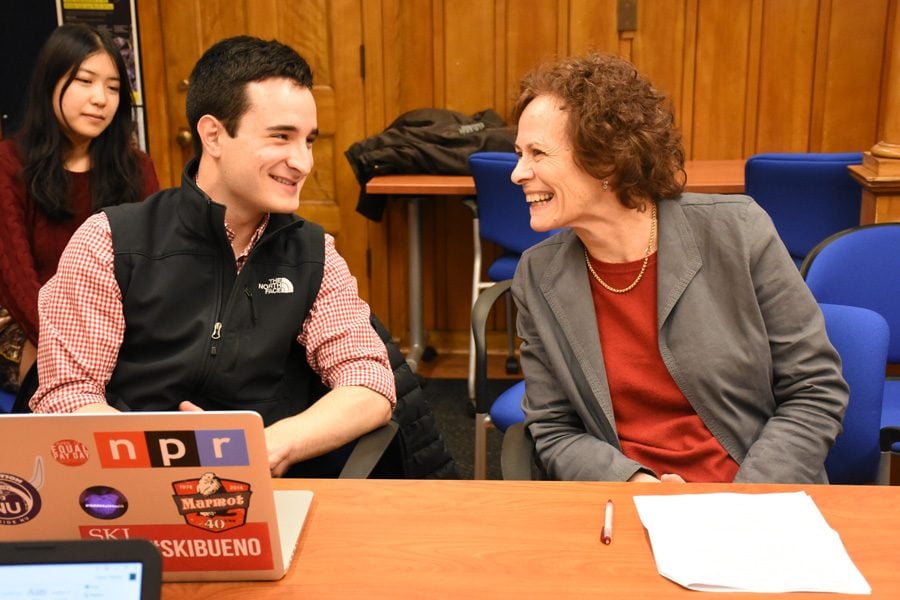Students discuss Karl Eikenberry’s qualifications, worldview in Political Union debate
Sophie Mann/Daily Senior Staffer
Medill sophomore David Gernon and French and comparative literature Prof. Michal Ginsburg find common ground in Monday’s Political Union debate on Karl Eikenberry. The former U.S. ambassador to Afghanistan was named the new executive director of the Buffett Institute in January, but the University announced in April that he would not longer be stepping into the position.
May 2, 2016
Karl Eikenberry isn’t coming to Northwestern, but debate over his appointment as executive director of the Buffett Institute carries on.
NU Political Union tackled the issue Monday evening, arguing over the faculty and student backlash that preceded the cancellation of Eikenberry’s appointment last month. Eikenberry, a former U.S. ambassador to Afghanistan and lieutenant general in the U.S. army, was named to the position in January, an appointment that immediately drew criticism for his military credentials and academic background, including his lack of a doctorate degree.
“Why should you settle for less?” French and comparative literature Prof. Michal Ginsburg asked. “Why should you hire somebody who doesn’t have a PhD? … There are people out there. Let’s look for them.”
Ginsburg, the lone faculty member in attendance, co-signed a letter in February with 45 other faculty calling for Eikenberry’s removal. She raised concerns over Eikenberry’s view of the humanities as a means to advance U.S. soft power, and also took issue with the “opaque” hiring process used to select Eikenberry.
Weinberg junior Lauren Thomas made the opening argument in favor of Eikenberry, stressing that faculty opposition to Eikenberry was not ubiquitous and that Eikenberry frequently was a critic of the U.S. military even while he was a part of it.
To Thomas, the appointment was also important for promoting diversity of thought.
“However open minded faculty think they are, they’re not seeing the full perspective. That is literally impossible,” she said. “We need more perspectives and more backgrounds at places like the Buffett Institute.”
Thomas and Medill sophomore David Gernon, the co-president of Political Union, made opening statements for each side of the issue, and afterward any of the about 20 students in attendance were free to make their own arguments.
Students in favor of Eikenberry’s appointment largely pointed to his experience as making him uniquely qualified for the role of executive director, and contended that opposition to Eikenberry was based not on his merits but on an unfair criticism of his past and personal beliefs.
Those who opposed Eikenberry countered that his approach to humanities research was what they found particularly problematic.
“There’s something to be said about his role in setting the tone for the Buffett institute,” Weinberg senior Karna Nangia said. “If you’re making comments where you want to use research institutions to further the interests of the military … (research) should be considered as a neutral space.”
The position in opposition to Eikenberry’s appointment convinced many in the room. A poll taken before the discussion tallied eight in favor of Eikenberry versus two against with 11 abstentions, and by the end this shifted to nine in favor, eight against and just four abstentions.
Gernon, who helped organized the debate, said he thought the topic would be well received by students, and overall seemed impressed with the turnout and tone of the event.
“This was a pretty good crowd — usually it’s not quite this big,” Gernon said. “People definitely spoke more passionately than normal.”
Email: [email protected]
Twitter: @BobbyPillote


